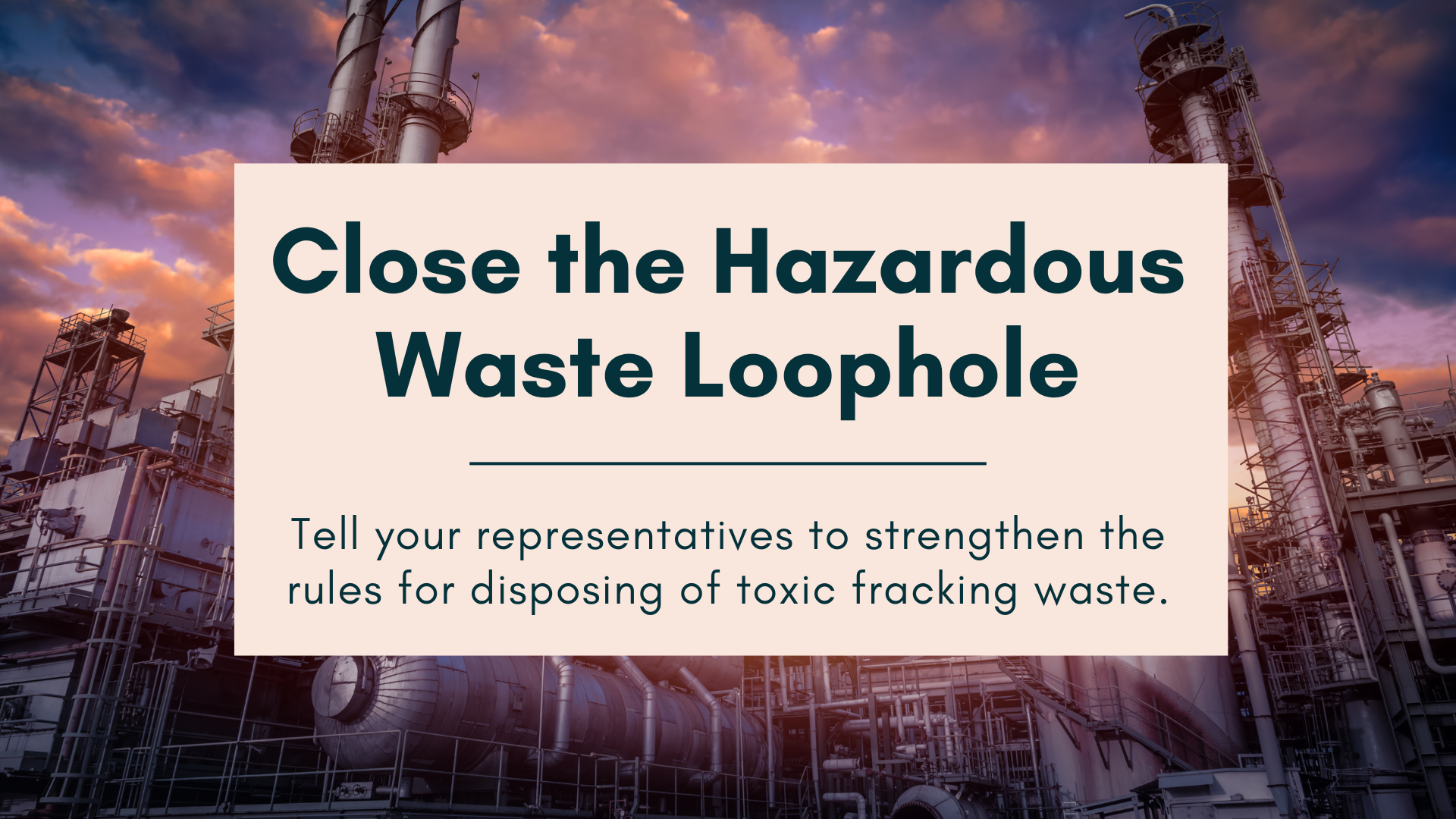This blog was written by Organizing Fellow Phoenix White.
Because of a shortsighted exemption made 30 years ago, Pennsylvanians are exposed daily to potentially toxic and radioactive waste produced by the oil and gas industry. For the last three decades, these companies have taken advantage of a loophole in state laws governing the disposal of toxic drilling waste. This drilling waste contains proprietary chemical additives, hydrocarbons, heavy metals, radionuclides, and salts that are harmful to both humans and our environment. Pennsylvania’s Solid Waste Management Act and Title 58 exclude oil and gas companies from mandated thorough tests or treatment of their waste prior to disposal in municipal landfills or wastewater treatment facilities. This failure to test or treat means that the toxic and radioactive material present in drilling waste ends up in public water systems through landfill leachate, and that workers hauling the waste could be exposed to radioactive elements. Leachate is water that has percolated through solids, which then contains some of the constituents that have leached out. The leachate results whenever solid hazardous waste is brought into landfills and is exposed to rain or naturally occurring water in the waste. This contaminated liquid is then transported to wastewater treatment plants which supply drinking water to communities as well as water for irrigating crops and sustaining local aquatic life.
Between 2003 and 2018 there was a massive 1,500% increase in the volume of toxic, potentially radioactive waste generated by these companies. One particular concern is the disposal of radium-226, which researchers have found at levels 650 times higher where treated conventional oil and gas wastewater was discharged. The PA DEP has found levels of radium ranging from 40.5-26,600 picocuries per liter in fracking waste (a picocurie or pCi is a measure of the rate of radioactive decay of radon), while the EPA drinking water limit is just 5. Radium has been known to cause “anemia, cataracts, fractured teeth, cancer (especially bone cancer) and death” according to the Centers for Disease Control. More than 1,100 sites process fracking waste in multiple states each year at facilities near homes or schools, and most of this waste is transported on public roads. Due to this lack of foresight, State Representative Sara Innamorato (D-Allegheny) and Senator Katie Muth (D-Berks, Chester, Montgomery) have introduced legislation to regulate this waste and to close this loophole, but it needs your support.
Being able to take advantage of the Solid Waste Management Act and Title 58 gives oil and gas companies an unfair advantage over other industries, while pushing responsibility for their consequences to public health and the environment onto residents, communities, and taxpayers of the commonwealth. On the other hand, if fracking waste is safe, it is in the best interest of legislators and extractive companies to support legislation that would allow for waste to be monitored in a way that gives members of impacted communities peace of mind. This is a bipartisan issue, and we are asking folks across party lines to support this much-needed legislation to protect our communities from harm. The hazardous waste loophole for the benefit of industry and causing harm to the residents of PA must be closed. Oil and gas operators must follow the same rules as other similar industries: If the wastes they create meet the definition of hazardous, they should be managed as such.
To stay up to date about this legislation from home, and to sign the petition to put our public health first and to support closing this dangerous loophole exposing our communities to harmful waste from the oil and gas industry in Pennsylvania and across the country, please click here: https://secure.everyaction.com/Dwy7-XodA0yZTsc3Dx9WxA2
If you would like to see PA state oil and gas waste maps, visit maps.arcgis.com and psehealthyenergy.org.
Resources:
- CCJ’s Radioactive Fracking Resource
- Radiation and Fracking blog
- CCJ one-pager on HB1353, closing the hazardous waste loophole
- Earthworks Pennsylvania Fracking Waste Report (2019)
- Fractracker interactive map of facilities accepting hazardous waste near you
- Innamorato, Muth Propose Legislation to Protect Health and Environment
- Muth, Innamorato Propose Legislation to Protect Health, Environment
- House Co-Sponsorship Memoranda
- Senate Co-Sponsorship Memoranda

